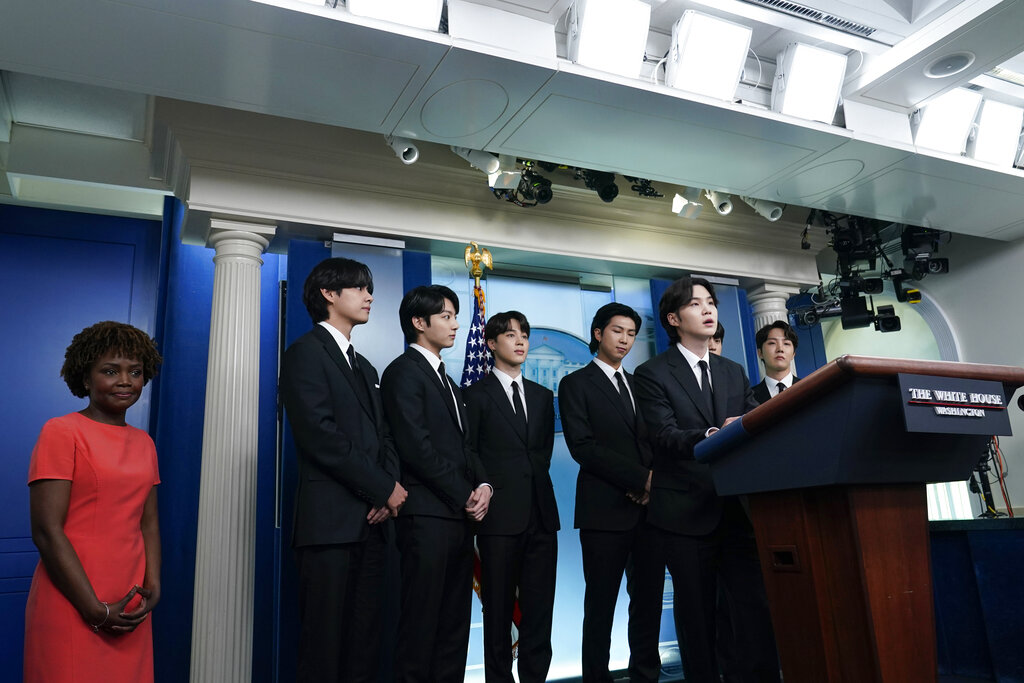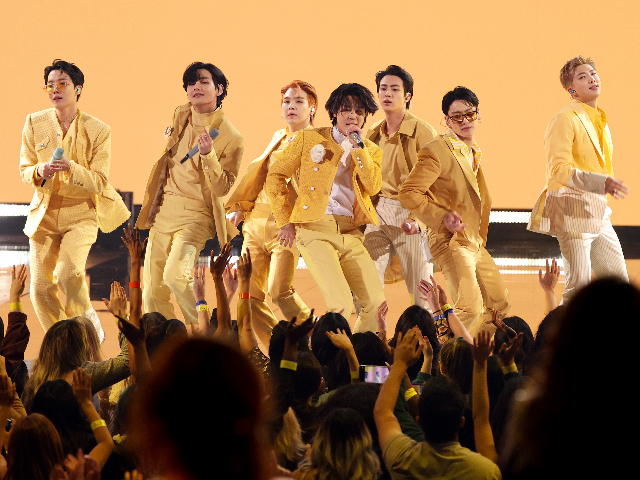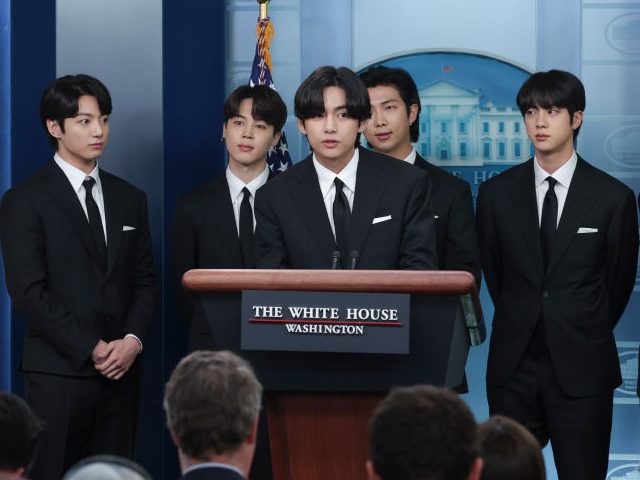Members of the South Korean boy band Bangtan Sonyeondan (BTS), arguably the world’s most popular musical act, told the White House press corps in Washington, DC, on Tuesday that they had agreed to meet with President Joe Biden to contribute to ending hate crimes around the world.
The pop artists addressed the White House briefing room shortly before a scheduled meeting with Biden. BTS was scheduled to meet with the president after the latter’s summits with socialist New Zealand Foreign Minister Jacinda Ardern and Federal Reserve Chairman Jerome Powell. It was BTS’s first-ever meeting with the president of the United States.
In seven short statements, one per band member, BTS thanked fans for their support and Biden for his time and interest in meeting them. The members did not respond to questions, though reporters tried to ask them. Most band members addressed the briefing room in Korean.
“We were devastated by the recent surge in hate crimes, including Asian-American hate crimes,” band member Jimin said through a translator. “To put a stop to this and support the cause, we’d like to take this opportunity to voice ourselves once again.”
Another band member, Jungkook, told reporters that “music is always an amazing unifier,” and they were “surprised that music created by South Korean artists reaches so many people around the world.”
The band also noted that today was the last day of Asian American and Pacific Islander Heritage Month.
The White House announced last week that it would host BTS for a one-on-one meeting with Biden to discuss “Asian inclusion and representation,” as well as policies to prevent anti-Asian hate crimes and properly prosecute and report hate crimes.
“President Biden and BTS will also discuss the importance of diversity and inclusion and BTS’ platform as youth ambassadors who spread a message of hope and positivity across the world,” the White House release detailed.
White House reporters added on Tuesday prior to BTS’s statements that the band had agreed to film content for the White House on Asian inclusion and “anti-Asian hate crimes.”

Members of the K-pop supergroup BTS, (L-R), V, Jungkook, Jimin, RM, Jin, J-Hope, Suga, join White House press secretary Karine Jean-Pierre during the daily briefing at the White House in Washington, DC, on Tuesday, May 31, 2022. (AP Photo/Susan Walsh)
The band’s invitation to discuss racism against Asians in America appeared to be in response to a public statement BTS put out last year supporting the “Stop Asian Hate” campaign, stating that they had endured discrimination in their careers and opposed “racial discrimination” and “condemn violence.” The statement notably did not mention the United States or reference any specific occasions of racism. The band had recently been the subject of racist remarks by a German radio station that had compared them to the Chinese coronavirus.
BTS’s arrival in America this week did not pass without some controversy among fans. Shortly before the meeting, social media fans erupted in panic after one of the band’s members, Jungkook, deleted posts on his Instagram account. Jungkook had arrived in America a day before the rest of the band, according to the South Korean news agency Yonhap.
“Worried fans took to Twitter to post messages, with many asking if the singer was okay, while others wondered if it was part of the promotions for the band’s upcoming album, Proof,” Indian Express reported. The K-pop industry has endured several high-profile suicides of young artists, leaving fan bases sensitive to any indication of distress.
The “meltdown” reportedly ended when another band member, J-Hope, published a video on social media where Jungkook could be heard speaking in the background.
While Korean pop music, or K-pop, has become a global phenomenon after over a decade of making significant inroads in international markets, BTS’s success in the industry has been unprecedented, earning over 25 Guinness World Records and becoming the first Korean act to debut at the top of the Billboard 200 charts and receive a Grammy Award nomination. That success has had political repercussions at home, where the government agreed in 2020 to allow K-pop acts identified as “significant contributors to the elevation of national reputation” to defer mandatory military service to age 30 (all men must serve by age 28 if not qualified to receive an exemption). The mandatory military service requirement has resulted in the collapse, sometimes in disgrace, of several other K-pop boy bands.
More recently, rumors that conservative President Yoon Suk-yeol would invite BTS to his inauguration on May 10, which his administration denied, prompted confusion and some outrage from left-wing BTS fans. The band has not inspired any similar backlash for their meeting with Biden at press time.

(L-R) J-Hope, V, Suga, Jimin, Jin, Jungkook, and RM of BTS perform onstage during the 2021 American Music Awards at Microsoft Theater on November 21, 2021, in Los Angeles, California. (Kevin Winter/Getty Images for MRC)
Outside of Korea, BTS members have involved themselves repeatedly in political issues, though without taking polarizing stances. The band has twice addressed the United Nations, for example, once on the issue of helping galvanize youth to make positive changes and on another discussing “sustainable development” alongside leftist ex-South Korean President Moon Jae-in – an event that similarly failed to outrage those concerned about a potential Yoon inauguration performance.
In China, the Communist Party has banned most of the country’s largest BTS fan groups and attempted to create Party-controlled boy bands to combat BTS’s influence. The communist regime’s campaign against the band began overtly in October 2020, when the Korea Society honored BTS with its James A. Van Fleet Award for “outstanding contributions” to American-Korean relations.
“The Korea Society’s 2020 Annual Gala is especially meaningful, as this year marks the 70th anniversary of the Korean War,” RM said in his acceptance speech. “We will always remember the history of pain that our two nations shared together and the sacrifices of countless men and women.”
Chinese state media outlets condemned the remark for omitting China and demanded RM also thank China for its role in the Korean War. China fought alongside North Korea against South Korea and the United States, a fact outraged Chinese government observers never reconciled with their demand for gratitude from the South Korean pop stars.

COMMENTS
Please let us know if you're having issues with commenting.